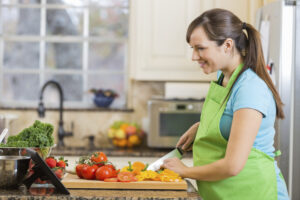Nutrition During Pregnancy

What you eat and drink when you are pregnant helps support you and your baby. To help meet your nutrient needs and your baby’s nutrient needs:
- Eat a variety of foods.
- Take a daily multivitamin with folic acid and iron in it.
On this page, you will find information about nutrition when you are pregnant and answers to common questions.
Why is nutrition important when I am pregnant?
Nutrition during pregnancy:
- Supports your health and well-being.
- Helps your baby get the nutrients they need to grow and develop.
What should I eat when I am pregnant?
Use Canada’s Food Guide to help make food choices. Eat a variety of foods each day, including:
Check out Healthy eating when pregnant and breastfeeding on the Canada’s Food Guide page for more information.
Why do I need to take a daily multivitamin with folic acid and iron during pregnancy?
During pregnancy, it may be hard to meet the increased needs for some nutrients from food alone, such as folate (folic acid) and iron. These nutrients are important for a healthy pregnancy:
- Folic acid helps a baby’s spine, brain and skull develop properly and helps create new red blood cells for both of you.
- Iron helps build your red blood cells – and your baby’s too. Red blood cells carry oxygen and iron to your baby. It is important that babies have a good supply of iron when they are born.
Eating a variety of foods and taking a multivitamin with folic acid and iron can help make sure you get enough of these nutrients. For most people, your multivitamin should have:
- 4 mg (400 mcg) of folic acid
- 16-20 mg of iron
Some people may have different nutrient needs. Talk to your healthcare provider to learn what multivitamin is best for you.
How much weight should I gain?
Gaining weight during pregnancy is natural, normal, and healthy. The amount of weight you should gain is based on your weight before you become pregnant. Your healthcare provider can help you decide a weight gain that is right for you.
Check out Pregnancy and Weight Gain for more information.
Other frequently asked questions about prenatal nutrition
Are there foods I should avoid eating during my pregnancy? (click to expand) »
You are at a higher risk of food poisoning when you are pregnant. During pregnancy, food poisoning can be dangerous to you and your baby.
To lower your chances of getting food poisoning, there are some foods you should avoid consuming while pregnant. Examples include:
- Hot dogs straight out of the package without further heating
- Non-dried deli meats, such as roast beef, turkey, and bologna
- Raw or undercooked meat, seafood, or poultry
- Raw or lightly cooked eggs (runny egg yolk) or foods that have raw eggs (such as cookie dough, homemade Caesar dressing)
- Soft (such as Brie and Camembert), semi-soft (such as Havarti) and blue-veined cheeses (such as Stilton)
- Raw sprouts
Check out Food Safety for Pregnant Women for more information on food safety during pregnancy, including a detailed list of foods to avoid and safe alternatives.
Is it safe to eat fish during my pregnancy? (click to expand) »
Fish and shellfish can be a great source of nutrients such as protein, iron, vitamin D, and omega-3 fatty acids. These nutrients are important for your baby’s growth and development.
Most fish and shellfish are safe to eat while pregnant. Some fish have higher levels of mercury, which can harm your baby’s brain development.
Limit the amount of these fish you eat:
- Fresh/frozen tuna
- Canned albacore (white) tuna
- Shark
- Swordfish
Check out Mercury in Fish for more information.
Should I avoid caffeine during my pregnancy? (click to expand) »
Caffeine is safe in small amounts when you are pregnant. Keep your caffeine intake below 300 mg a day. Coffee, tea, caffeinated soft drinks, energy drinks, chocolate, and some herbs have caffeine.
Check out Caffeine in Foods to find out how much caffeine is in different foods and drinks.
Energy drinks and some herbal teas are not safe to drink when you are pregnant.
The following herbal teas are generally considered safe if limited to 2-3 cups per day:
- bitter orange/orange peel
- echinacea
- peppermint
- red raspberry leaf
- rose hip
- rosemary
Can I drink alcohol during my pregnancy? (click to expand) »
There is no safe amount of alcohol during pregnancy.
What is Toxoplasmosis? (click to expand) »
Toxoplasmosis is an infection that can make your baby very sick. You can get toxoplasmosis from eating raw or undercooked meats and unwashed vegetables. You can also get it from touching cat feces.
To protect you and your baby:
- Cook meat well.
- Wash vegetables well.
- Do not eat or drink unpasteurized milk products.
- Wash your hands and the surfaces you use to prepare food.
- Ask someone else to change the cat litter.
- Wear gloves when gardening or if you change the cat litter. Wash your hands when you are done.
Struggling to access food?
There are programs that may be able to help:
- Prenatal Infant Nutrition Supplement
Monthly financial benefit for eligible pregnant people or families with children under the age of one.
- Healthy Baby Club
Prenatal nutrition and support program offered through Family Resource Centres. - 211 Newfoundland and Labrador
A listing of community, government and social service programs and resources available.
For information about eating healthy for less, check out Healthy Eating for Less.
Services related to this information:
- Contact your Public Health Nurse
- 811 HealthLine/Dial-a-Dietitian (Newfoundland & Labrador) – Call 811 or 1-888-709-2929 / TTY 1-888-709-3555
- Contact your local Family Resource Centre.
- 211 Newfoundland and Labrador

